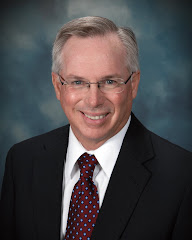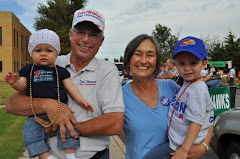Brownback Administration Reveals Details of School Finance Reform Plan
On Wednesday, December 14 the Brownback administration presented their school finance plan to the State Board of Education. The plan would be a dramatic and far-reaching change from the present system of school finance. Many of us are still working to fully understand the plan. An initial concern is the proposal to uncap the local property tax limits for school finance. This could well lead to a shift from state financing of public education to local financing, which in turn could produce a greater reliance on property tax. It could also, over time, lead to unequal educational opportunities across the state. I expect to have more to say about this in a future newsletter.
State Tax Reform
Governor Sam Brownback and members of his administration have been developing a tax reform proposal that could dramatically change the tax structure of the state in coming years by gradually reducing personal and corporate income tax rates. The intention is to eventually get these rates to zero by ratcheting them down over time. There is certainly merit in the proposal as we search for ways to jump-start the economy and make Kansas a favorable place to live and do business in the future. However as is usually the case, the devil is in the details, and those details have not yet been released. Secretary of Revenue Nick Jordan recently conducted a listening tour of Western Kansas to gather input on the concept. The following are my remarks at his stop in Hays on November 2:
Secretary Jordan, I want to welcome you to Western Kansas and I thank you for conducting this listening tour on possible tax reform. I agree with you that reducing personal and corporate income tax rates is a desirable goal, and that doing so can lead to economic growth for the state. We must insure that our tax policy enhances our competitive position relative to neighboring states. However that is true not only for income tax, but for sales and property tax as well.
I applaud and support your efforts, and the hard work of Governor Brownback’s entire “tax team” in searching for a more growth-oriented but equitable tax plan. Finding that “best fit” solution will require input from many Kansas policymakers and citizens. I submit the following questions as issues that deserve careful consideration as we work together toward that end.
For many years Kansas government has been largely financed by the “three-legged stool” of sales tax, income tax, and property tax. Part of the rationale for the three-legged stool is that it spreads the burden of financing government broadly, over as many Kansas citizens and visitors as possible. It is often said that such a system is relatively fair or equitable. If Kansas moves from a “three-legged taxation stool” to a “two-legged stool”, does the Kansas taxation system become less equitable?
The experience of some states with no income tax indicates that governmental revenues become less stable if income tax is eliminated. If Kansas moves from a three-legged stool to a two-legged stool, do governmental revenues become more volatile and less predictable?
Rural Kansas is currently saddled with property tax rates that are much higher than the rest of the state. Imagine how difficult it is to generate any new economic growth in these rural communities with total mill levies ranging from 200 to as high as 274, when major urban centers in the state have total mill levies as low as 121 (Wichita) or 114 (Overland Park). Or equally as important, imagine trying to keep a struggling retail business alive in a rural Kansas town with such a high property tax burden. If we move to reduce income tax and property taxes go up as a result, what do we say to the residents of Smith Center, where the mill levy is now 274, the school local option budget is maxed out, and the sales tax trade pull factor is an anemic 0.70? What hope do we offer to the residents of dozens of similar rural Kansas communities where property taxes are through the roof and population has declined by double digits in the past ten years? What assurance can we give them that tax reform will not accelerate those unfortunate trends?
Kansas’ three-legged stool is already seriously unbalanced. As recently as fiscal year 2008 the funding sources were roughly equivalent, with property tax bringing in $3.8 billion, income tax $3.4 billion, and sales tax $3.1 billion. But two short years later, property taxpayers were shouldering a disproportionate share of the burden, with property tax raising $4 billion in state and local revenue, but sales and income tax only contributing $2.9 billion and $2.7 billion, respectively. In the past, Kansas policy-makers have recognized the negative effects of high property taxes and taken steps to mitigate those effects. The Kansas legislature for many years maintained an Ad Valorem Property Tax Reduction Fund, which channeled state-raised revenues to local units of government to enable them to reduce property taxes. In recent years that fund has not been funded by the Kansas legislature. When the Kansas lottery was first established in the 1980’s, one of the agreed-to uses of the revenue generated was property tax reduction. Today that is nothing more than an empty promise. And now, tax reform and school finance revisions are being considered that point to even more reliance on local property tax. My final question is, is that appropriate? It is really the best tax and public policy to make the property tax the bedrock foundation of financing governmental operations? Many Kansas residents, including me, would answer “no” to that question, and I urge very careful consideration of the negative ramifications of moving in that direction.
After the meeting with Secretary Jordan my remarks were picked up by the folks at the Kansas Economic Progress Council and reprinted in their newsletter.
Medicaid Reform
On November 8 Governor Brownback and Lieutenant Governor Colyer revealed their proposal to reform Medicaid in Kansas. KDHE Secretary Robert Moser, M.D., Aging Secretary Shawn Sullivan and SRS Secretary Rob Siedlecki joined them for the announcement. Medicaid obligations continue to consume a greater share of Kansas government resources from year to year, and continuing on that path is simply not acceptable.
The essential part of the proposal is that every recipient of Medicaid in Kansas will be required to be a member of a managed care organization. Those organizations will be under contract with the state to deliver those services, and the idea is that better management of the case of every Medicaid recipient will result in fewer doctor visits, fewer tests, fewer hospital stays, and better client health.
I believe this is welcome and exciting news. The topic that is usually absent from discussions about health care reform is the issue of cost containment. The Brownback administration’s proposal could make significant progress toward that goal. That means it has the potential to save the state hundreds of millions of dollars. Just as importantly, it means that scarce health care resources that may now be wasted on unnecessary doctor visits or duplicative tests or procedures could then be freed up to meet the growing health care needs of all Kansans. The challenge will be to insure that the new system does not lead to cuts in provider reimbursement rates nor degraded service to Medicaid recipients.
Busy Legislative Session Coming Up
The 2012 legislative session which begins in early January has the potential to be one of the most significant and far-reaching legislative sessions in recent memory. Here are just a few of the important issues that are awaiting solution:
- Tax reform
- Medicaid reform
- Overhaul of KPERS retirement system
- School finance reform
- Crafting a new state budget as the economy struggles to recover
- Redistricting
With each of these issues I will be striving to determine what is best for the residents of Kansas, particularly those who reside in Western Kansas. I ask for your perspective on these issues or any other that you would like to see addressed by the legislature. Now is the time to research those issues and develop legislation for consideration by the legislature. Please contact me with your ideas, and tell your friends as well. I welcome any input.
I use this newsletter to keep the residents of District 118 informed of legislative issues, and I am always looking to expand my email address list. If you have friends, family, or associates who might be interested in receiving the newsletter I would appreciate your forwarding their contact information to me.
2012 Campaign Season
If the legislative session is nearly upon us, the campaign season for the 2012 elections cannot be far behind. I have already filed for re-election, even though the boundaries of my legislative district will not be known until redistricting is completed by the legislature. My district currently includes Wallace, Logan, Gove, Trego, Wichita, Lane, and Rush counties and portions of Ness county. Problem is, the district is nearly 4000 residents short of the ideal number required for equal representation for all Kansans. That means that my district will get larger and I will have new territory (possibly another county or two) in which to campaign and become known. And the contentious issues that await decision during the 2012 session could well lead to challengers. My campaign fund must be replenished soon, and I must respectfully ask for your help.
Please mail contributions to Hineman for Kansas, Derek Martin - Treasurer, 116 S. Longhorn Rd., Dighton, Kansas 67839. Any and all contributions will be enthusiastically accepted but please exercise some restraint… the limit on donations is $500 per individual or business!
Legislative Showmanship
Kansas Governor’s Inaugural Ringneck Classic
On November 19 I had the opportunity to participate in the Kansas Governor's Inaugural Ringneck Classic pheasant hunt in Oakley. Seventy hunters and seventeen guides filled the fields for a great day of NW Kansas pheasant hunting. My group included Heath Wright, Heath Wright, lead singer for the country band Ricochet; Drew Switzer, morning meterologist for WIBW-TV in Topeka; and Tom Palace, Executive Director of the Petroleum Marketers and Convenience Store Association of Kansas. We were guided by Luke Haines of FFF Ranch, Brownville, KS, and all of had limited out by 2:30. What a great way to publicize the fantastic hunting opportunities of Northwest Kansas. Kudos to Governor Brownback, KDWP Secretary Robin Jennison and staff. Thanks also to the many volunteers in Oakley who worked hard to make the inaugural event a great success.
Cowboy Logic: Don’t accept your dog’s admiration as conclusive evidence that you are wonderful.
Quote of the Week: As long as there are tests there will be prayer in schools.
Sermon in a Sentence: The best remedy for a short temper is a long walk.





No comments:
Post a Comment